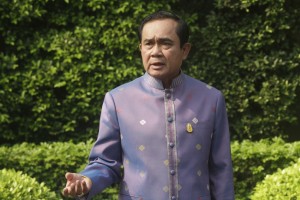Thailand to hire China to build first 250km of northeast line starting later this year.
THAILAND aims to seek “friendly” terms with China when it comes to the interest rate and price for the multi-billion-baht high-speed railway project, which will now fully paid for by the Thai side, Transport Minister Arkhom Termpittayapaisith said yesterday.
“Since it is a government-to-government project, China should offer ‘friendship’ terms on interest rates and project costs,” he said.
Prime Minister Prayut Chan-o-cha said yesterday Thailand was capable and financially prepared to carry out the project alone. He said the government had planned to spend over a trillion baht for infrastructure projects but rules on environmental impact assessments had delayed use of the money.
“We will no longer do the project with China. It’s better to do it alone,” he told reporters in Bangkok after his return from China.
General Prayut said China would be hired to build the project under a government-to-government deal, adding that he expected construction to start as soon as possible.
He said China had no problem with the Thai side’s decision.
“They are OK. They said that they just want to help and don’t really want anything in return. The Chinese said they felt like Thai people do not trust them. I told them that’s not true,” Prayut said.
The PM said the project would start with the section from Bangkok to Nakhon Ratchasima – the first 250km of the total planned length of over 800km. He said funding would come from loans.
The PM announced his government’s decision to go ahead on Wednesday with the scheme after meeting his Chinese counterpart Li Keqiang at the Mekong-Lancang Cooperation Summit in China.
Prayut said Thailand would be the sole investor and would hire China to develop the first-phase to Nakhon Ratchasima, after the two sides were unable to agree on a joint-venture investment model.
He said this would at least help get the project off the ground after months of delay. The premier also said it was better for Thailand to be the sole investor and the Chinese side had agreed to this. He did not elaborate.
Arkhom, meanwhile, said the other routes, from Kaeng Khoi to Map Ta Phut and Nakhon Ratchasima to Nong Khai, would be suspended for the time being.
The first phase will cost Bt170 billion, based on local estimates compared to Bt190 billion estimated by China. The entire 800km-plus project would cost Bt530 billion, which was far too much of an investment burden for Thailand at this stage, Arkhom said.
‘He went on to say that the investment cost for the first phase – Bangkok to Kaeng Khoi in the Central region and to Nakhon Ratchasima in the Northeast – would not be a burden because the fees earned from allowing the private sector to develop areas around train stations would pay for the construction.
‘We’ll still use Chinese trains’
But, he said, the project would be delayed for another four or five months in order to allow time for negotiation on the interest rate and project cost. “We will still use Chinese trains as it is a government-to-government project and we have agreed to bring the Chinese 1.435-metre standard gauge high-speed railway to Thailand for the first time.”
As for passenger traffic, he pointed out that there was a high demand in the Bangkok-Nakhon Ratchasima route and that the government would extend the track to Nong Khai when it was ready. However, the Kaeng Khoi-Map Ta Phut section would be postponed indefinitely.
Arkhom said Thailand opted to be the sole investor because it was not able to offer other benefits to Beijing, including the right to develop the right of way and areas around the railway stations. Also it could not offer benefits such as mining rights like in the case of the Chinese-Lao rail project, which is a 70:30 joint venture scheme.
And because Thailand will provide the investment, it can decide on its financing sources, which can include China, though the interest rates would have to be competitive, he added.
China would be in charge of engineering, procurement and construction management, supplying trains, signalling systems and tracks, though Thai contractors would be allowed to take part in the construction. China could also have a hand in operating the service via a joint venture with the Finance Ministry, State Railway of Thailand and private sector, though it was too soon to talk that, he said.
Dr Aksornsri Phanishsarn, head of the Thai-Chinese Research Centre, said Thailand decided to go solo in terms of investment as it found China’s conditions unacceptable.
Source: http://www.nationmultimedia.com/politics/Sweeter-terms-sought-for-Sino-Thai-rail-deal-30282460.html




